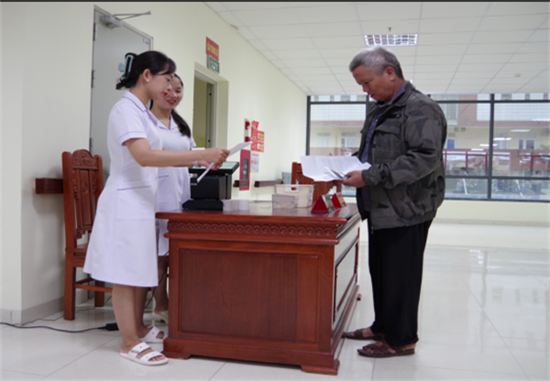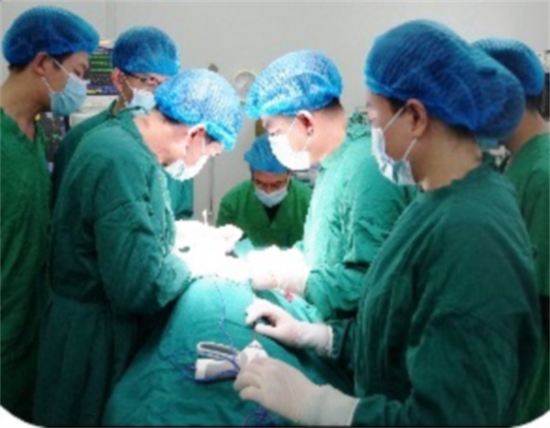Military Hospital 5 improves the quality of health care for soldiers and people according to Uncle Ho's teachings
Deeply imbued with Uncle Ho's teachings: "Love the sick,... cure diseases and maintain the health of compatriots. That is a glorious task", over the years, Military Hospital 5 has always strived to overcome difficulties, built an increasingly modern, specialised, friendly hospital, constantly improved the quality of medical examination, treatment, and health care for soldiers and people, contributing to embellishing the beautiful image of "Uncle Ho's soldiers" - the military doctors of the new era.
Military Hospital 5 is under the Department of Logistics and Technics, Army Corps 12, the predecessor of the second practical Hospital Branch of the Military Medical School, established on 10 July 1950, with the task of treating wounded soldiers on the Northwestern fronts. Over 75 years of construction and development, generations of cadres, doctors, nurses, professional and service staff of the Hospital have always been united, unified, overcome difficulties and hardships, successfully completed all assigned tasks, and built the tradition: "Solidarity - Dynamic Creativity - Dedicated Service - Constant Growth". With outstanding achievements, the Hospital has twice been awarded the title of Hero of the People's Armed Forces by the State and other noble awards.
 |
| Instructing patients coming to the Hospital |
Pursuant to Decision No. 6047/QD-BQP dated 22 November 2023 of the Minister of National Defence on changing Military Medical Branch 5, under Military Hospital 7 (Logistics Department, Military Region 3) into Military Medical Hospital 5 under the Department of Logistics and Technics (Corps 12). Currently, the Hospital owns nearly 450 beds with modern infrastructure and equipment. The Hospital is assigned the task of ensuring military medicine for training, combat readiness, health care for officers and soldiers of agencies and units of the Corps and the Ministry of National Defence stationed in the area; participating in admission, examination and treatment of patients in Ninh Binh province and localities in the north of Thanh Hoa province; scientific research; organising rotating forces to ensure military medicine for Phan Vinh island (Spratly islands) and being ready to carry out other urgent tasks.
With the turning point adjustment in organisation, forces and mission requirements, the need for medical examination and treatment of soldiers and people in the area has increased, posing multiple difficulties and challenges for it. To complete the task, the Party Committee and the Board of Directors of the Hospital identify that improving the quality, capacity and professional qualifications of the medical staff is the key and decisive step.
Imbued with Uncle Ho's teachings: "... it is necessary to love and care for the sick as if they were our brothers and sisters, considering their pain as our own. A good doctor must be like a mother", the Hospital focuses on building a team of cadres, doctors, and professional staff "with bright medical ethics". Accordingly, specialised departments, divisions, and faculties strengthen education and dissemination for cadres, doctors, and staff to grasp the Party's resolutions, regulations, and guidelines of the Health Sector on people's health care; build the service style and attitude of medical staff according to the 12 principles of medical ethics, communication culture, and behaviour with patients and their families; closely link the training and development of medical ethics of military medical practitioners with promoting the study and following of Ho Chi Minh's ideology, morality, and style; movements, campaigns, and social activities, such as "Building a 5-good Military Medical Unit", "Military Medical Soldiers follow Uncle Ho's teachings", "Joining hands for community health", etc. The Hospital has proactively developed and issued regulations and rules on medical ethics, morality, and expertise; at the same time, concretising revolutionary ethical standards based on the criteria of a Military Medical practitioner to ensure consistency with practice. On that basis, 100% of physicians, doctors, and professional staff have registered to be determined to cultivate, strive, and practice according to professional ethical standards; committed to implementing the content of "Three no's, three should's" in the hospital; strictly adhering to the motto: "Welcome patients when they come, take good care of patients while they stay, and give them useful advices when they leave". Thanks to that, cadres, doctors, and medical workers in the Hospital always have a strong political stance, maintain medical ethics, serve patients properly, wholeheartedly, and have a high sense of responsibility, creating sympathy with patients and their families when they come to visit and receive treatment, just as Uncle Ho advised: "A doctor not only has the duty to cure illnesses but also has to support the spirits of the sick".
Imbued with President Ho Chi Minh's thoughts on the relationship between "virtue" and "talent", along with improving "medical ethics", the Hospital focuses on building cadres, doctors, and professional staff with "deep knowledge of medical theory and good medical skills". This is a fundamental, long-term factor that determines the quality of completing political tasks, as well as enhancing its position and prestige. Implementing Uncle Ho's advice to doctors and medical staff: "Regarding expertise: continually study and research to make constant progress", the Hospital regularly manages and strictly implements professional and hospital regimes, focusing on 06 aspects of work and 10 basic regimes; strengthens and consolidates discipline and scientific working style, in accordance with professional principles, according to assigned responsibilities and tasks. In order to build highly qualified doctors, the Hospital focuses on closely combining using with training and fostering. Along with advising, proposing the mobilisation and appointment of cadres and doctors according to the needs of the specialties, the Hospital proactively selects suitable human resources to participate in training courses inside and outside the Army to improve their qualifications in all aspects; especially specialised techniques, access and master new and modern machinery and equipment. Effectively implement the comprehensive assistance and support of the 108 Central Military Hospital and the 103 Military Hospital; actively invite experienced and highly specialised doctors from other hospitals to train, coach and foster on-site the techniques that the Hospital has not yet met, such as surgical techniques for trauma, orthopedics, advanced laparoscopic surgery, advanced urological laparoscopic surgery, emergency resuscitation, traditional medicine for rehabilitation, etc. At the same time, regularly send forces to participate in training courses, seminars, scientific conferences and specialised training courses held by the Ministry of Health, the Military Medical Department (General Department of Logistics and Technics) and central and provincial hospitals. Thanks to the close combination of "theory" and "practice", the professional qualifications of cadres, doctors and staff are constantly consolidated and improved. Currently, the hospital's team of doctors basically all have postgraduate degrees; among those, first specialists, second specialists and masters account for nearly 70%. This is an important basis and foundation for the hospital to effectively implement cutting-edge techniques, improve medical examination and treatment capacity, ensure absolute safety, and prevent medical incidents due to subjective errors.
 |
| Conducting a surgery |
Faced with the strong development of science and technology, the Hospital focuses on investing in and effectively applying modern equipment and new techniques to perform professional tasks. To meet the increasingly high demand for examination and treatment, the Hospital has proactively invested funds for self-purchase, combined with requests from superiors to equip modern medical equipment and machinery, such as automatic biochemical and immunological testing system; RFA ultra-high frequency wave ablation system for treating thyroid tumours, implementing screening tests for early cancer detection, measuring viral load of hepatitis B, C, HIV, HPV, CT scanner, digital X-ray; colour ultrasound machine; 1.5 Tesla magnetic resonance imaging system (MRI), etc. Thanks to that, it has actively supported the team of doctors to diagnose the disease correctly and provide effective treatment regimens. At the same time, it is the basis for the Hospital to apply and master several new techniques within the scope of the line, such as emergency treatment of gastrointestinal bleeding, treatment of knee osteoarthritis by routine artificial joint fluid replacement, emergency blood ultrafiltration; thrombolytic injection technique to treat acute ischemic stroke, contributing to saving lives and minimising sequelae; laparoscopic surgery, total and partial hip replacement surgery; retrograde urinary stone endoscopic surgery; percutaneous nephrolithotomy (PCNL) with small tunnel Laser; endoscopic knee ligament reconstruction surgery. With modern equipment, the Hospital has successfully treated numerous cases of severe multiple trauma and serious illnesses, such as stroke, myocardial infarction, acute poisoning, septic shock, severe anaphylaxis, acute renal failure, cirrhosis, etc. Along with that, the Hospital proactively develops plans, orients the contents and creates conditions for the staff, physicians, doctors, and professional staff to promote creativity, actively conduct scientific research, find new methods, effective ways, promote initiatives, improve, and apply new techniques to continuously improve the quality of admission and treatment of wounded soldiers and patients. In the period of 2020 - 2025, 60 scientific research topics, initiatives, and improvements at the Hospital level were approved; 51 topics (15 valuable initiatives and improvements) were accepted and applied to serve the work of medical examination and treatment. The above successes are the foundation for the Hospital to confidently implement the project of Developing the application of population data, electronic identification and authentication to serve the national digital transformation in the period 2022 - 2025, with a vision to 2030 (according to Decision No. 06/QD-TTg, dated 6 January 2022 of the Prime Minister); continue to apply information technology in hospital management, admission, examination, treatment, health care for soldiers and people, moving towards implementing electronic medical records, electronic health records; implementing microsurgery techniques to connect tendons, blood vessels, nerves and initially achieve positive results.
With qualified military doctors who are dedicated to the profession, along with modern medical equipment, the capacity and quality of admission, examination and treatment of the Hospital have been increasingly improved, affirming its position, brand and reputation in the system of military hospitals at the same level and provincial hospitals in the area. This is a great motivation for the Hospital to strive to build up to the standards of a Grade I general hospital, meeting the increasingly high demands of healthcare for soldiers and people, worthy of the tradition of the Unit being twice a Hero of the People's Armed Forces.
Senior Colonel, Doctor. DANG DUC TAM, Director of the Hospital